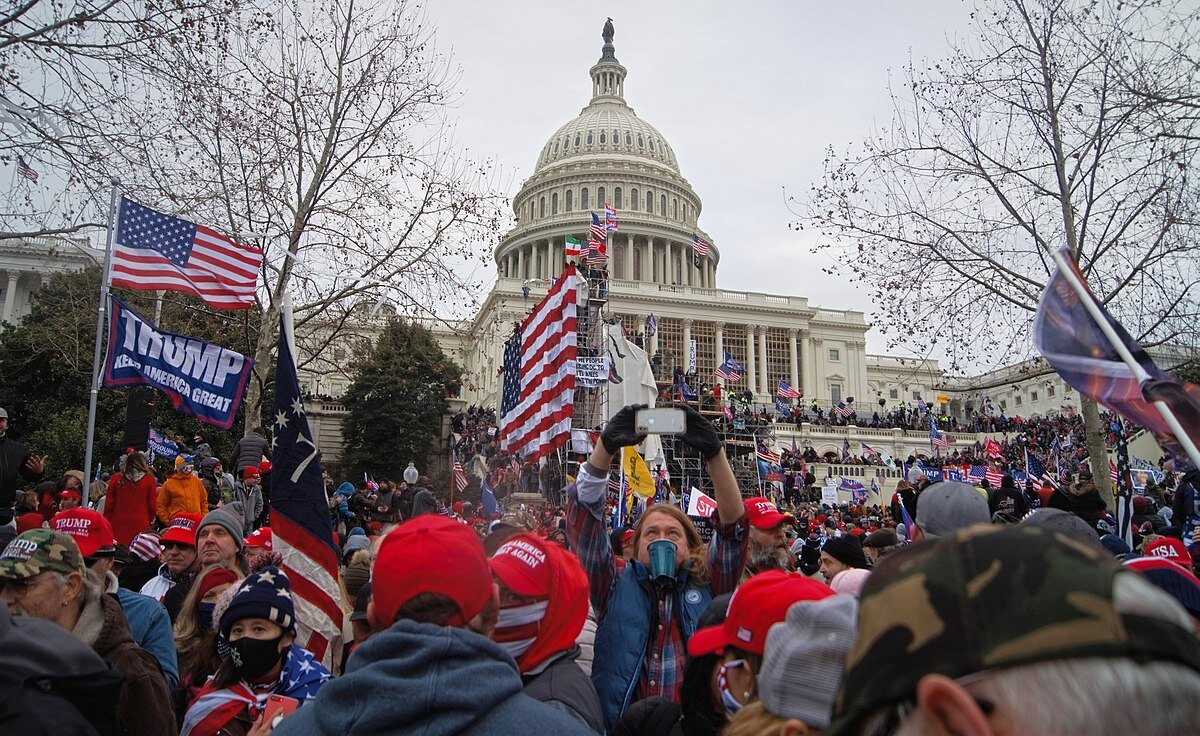Mass Insurrection and Q
By Tom Sandall
As discussed in last week’s post, conspiracy theories have re-entered contemporary political discourse, regarded as legitimate for some, a particularly problematic development. In the US, Donald Trump has been a particularly interesting case as he and his team members have directly engaged in stoking such theories. In modelling himself as an outsider, Trump has appealed to those who believe these grand theories. For instance, he made an appearance on the Alex Jones show Infowars in the run-up to the 2016 election. Alex Jones and his Infowars show are the most widely viewed conspiracy platform and rallies against the so-called New World Order (NWO). In the interview, Trump does not outright claim to share any conspiratorial views and uses language to distance himself from the theories whilst simultaneously claiming awareness. When questioned by Alex Jones if he was a “Clinton operative”, Trump then states that he has “heard about it from someone” before going on a tirade about how he was “once establishment” but is working to remove said “establishment”.
As he has modelled himself as an outsider, Trump has managed to amass followers that rally around this notion, mainly because he claims to be “draining the swamp” or rallying against the “deep state”. This has helped spawn a fanatical pro-Trump conspiracy theory that revolves around a mysterious figure called Qanon, who used the anonymous messaging boards 4chan and 8chan to disseminate his theories. Qanon’s name derives from his supposed Q clearance, the highest authorisation level within the US Department of energy, therefore, claiming access to sites equipped with nuclear capabilities. Qanon claims that a Satanist worshipping cannibalistic cabal who run a global child sex trafficking ring is operating behind the scenes and are conspiring against Trump to depose him from office. They believed that Trump would order mass arrests and executions in a day known as “the storm”. The Qanon conspiracy combines many pre-existing tropes grounded in conspiracies like Pizzagate and the modern antisemitic conspiracies centred around George Soros and the Rothschilds amongst a wide array of other conspiratorial theories. It is classed as a “big tent conspiracy” that can also constantly evolve and be open to multiple variations of interpretation, essentially a synthesis of both the Systemic (that a group is in control behind the scenes) and Event conspiracies (that event X (911) was caused by said group).
As Qanon followers have such a strong admiration for Trump, they played a large part in getting him re-elected, including the later attempts to overturn the election results. The microblogging platform Twitter is of particular interest in the Q anon case. Before being banned, Trump was notorious for his Twitter use and has retweeted posts from accounts that outright support the conspiracy theory . Qanon followers were massively beneficial to Trump’s re-election efforts as they are some of the most vocal, with adherents making a strong appearance at rallies. Because of this, influential members of Trump’s team have pandered to this group. Eric Trump has posted a large Q on his Instagram and the Q community slogan “where we go one, we go all”. His former security adviser Michael Flynn also posted a video of himself on Twitter taking the oath . When questioned about Q, Trump stated that he knew “nothing about it” but that they are “very much against paedophilia”. Speaking at an explicitly Qanon conference ,Michael Flynn denied all knowledge of the Qanon conspiracy. This is a form of strategic acknowledgement; they can create posts that invigorate followers yet deny any knowledge of the conspiracy’s intricacies.
Leading up to the Jan.6th insurrection, the hashtag #StopTheSteal gained momentum. It is very phrasing is conspiratorial, as it suggests some underlying group is pulling the strings behind the scenes. Q anon sporters were prominent in the Jan 6th insurrection with pictures of the so-called “Q anon shaman” featuring in many press articles. Many other Far-right groups also rallied behind this hashtag, such as the alt-right Proud Boys, the Three Percenters movement, the Boogaloo Bois, and those who hold far-right beliefs generally . The events on January 6th ultimately became violent, with one police officer losing his life defending the Capitol. When they successfully broke into the Capitol building, many aimed to find and kidnap both prominent democrats and Vice President Mike Pence as it was, he who formalised the election results, making him a traitor in their eyes. Not only do politicians seek to exploit conspiratorial beliefs so too do the West’s enemies, and there is compelling evidence that the states of China and Russia saw to influence these believers. This has Motivated them to become more aggressive and more significant in number, causing disruptions that benefit China and Russia as it erodes US legitimacy on the world stage.
In the run-up to January 6th, followers of Q saw this event as the start of “the Storm”. As the attempt failed to overthrow the election, the storm clearly did not happen. However, adherents to the conspiracy still believe that it will come, showing that conspiracies once believed are difficult to shake. As Snopes and other fact-checking websites continue to exist, they will not reach the levels of legitimacy observed prior to the outburst of World War 2. They will continue to straddle as legitimate to some, stigmatised to most in a position of limbo, so they remain an issue within contemporary politics. Most would like to see them outright stigmatised, but it is of greater importance to maintain freedom of speech as a right, so, unfortunately, they will remain within political discourse. This significantly is the duality we face with freedom of speech; questioning authority is essential, and states can peddle conspiracies themselves for their own advantage, just like Russia and China did during the pandemic (as well as stoking Q anon followers). Hopefully, now that Trump has lost his authority and voice on social media platforms, those willing to act violently will be far smaller in number.


